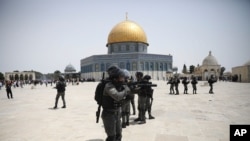Israeli police on Sunday escorted more than 120 Jewish visitors to a flashpoint holy site in Jerusalem where police actions in recent weeks had ignited protests and violence that triggered war in Gaza, according to the Islamic authority overseeing the site.
The Waqf said police cleared young Palestinians out of the Al-Aqsa Mosque compound and barred entry to Muslims under the age of 45. Muslims who entered were required to leave their IDs with police at the entrance. It said six Palestinians were detained, with four later released.
Israeli police denied there was any age restriction and said they arrested five suspects who “violated the public order.”
Israeli police spokesman Micky Rosenfeld said the site was open for “regular visits” and that police had secured the area to prevent “incidents.”
Israeli police had briefly clashed with Palestinian protesters after Friday prayers in an early test for the truce, which had taken effect hours earlier.
The Waqf said Sunday it was the first time Jews had been allowed to visit the site since May 4, a week before the war broke out.
The Al-Aqsa Mosque is the third holiest site in Islam. It sits on a sprawling hilltop in Jerusalem’s Old City that is revered by Jews as their holiest site because it was the location of the biblical temples. The site has often been the scene of Israeli-Palestinian violence and was the epicenter of the 2000 Palestinian intifada, or uprising.
Israeli police repeatedly clashed with Palestinian protesters in the days leading up to May 10, when Gaza’s militant Hamas rulers fired long-range rockets at Jerusalem. The threatened eviction of dozens of Palestinian families from a nearby Jerusalem neighborhood was cited as another major trigger of the 11-day war, which was halted by a cease-fire on Friday.
In recent years, increasing numbers of religious and nationalist Jews have visited the site. Palestinians fear Israel plans to eventually take over the compound or partition it. The Israeli government has repeatedly said it has no intention of changing the status quo, under which the Waqf oversees the site under Jordanian custodianship.
The Gaza war saw Israel unleash hundreds of airstrikes across Gaza at what it said were militant targets, while Hamas and other armed groups fired more than 4,000 rockets toward Israel. More than 250 people were killed, the vast majority of them Palestinians.
The Israeli strikes leveled a number of large buildings in the impoverished coastal territory, which is home to more than 2 million Palestinians. Gaza has been under a crippling Israeli-Egyptian blockade since Hamas, an Islamic militant group, seized power from forces loyal to the internationally backed Palestinian Authority in 2007.
The International Committee of the Red Cross said Friday an estimated 700,000 Palestinians are affected by damage to power and electricity infrastructure, with the water supply decreased by 40%. The group said thousands of people have lost their homes, businesses and places of work in Gaza from the bombardment.
The war also may have left hundreds of unexploded munitions across the territory, the ICRC said.
On Sunday morning, hundreds of municipal workers and volunteers started a one-week campaign to clear rubble from Gaza’s streets. The work began outside a high-rise building that was flattened by Israeli warplanes during the early days of airstrikes on Gaza, with workers loading rubble into donkey carts and small pickup trucks.




